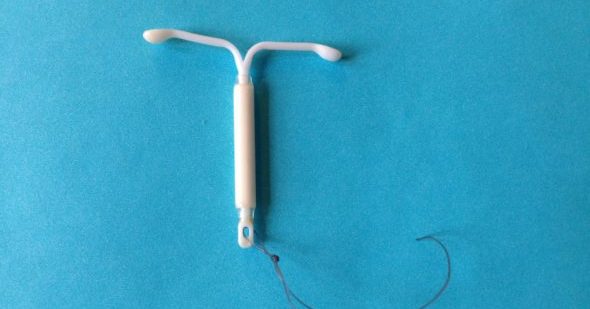
Birth control is a super effective way to help prevent pregnancy if you’re having or thinking about having penis-in-vagina (PIV) sex.
But unfortunately, we don’t talk about it openly very much. This means I spend a lot of time debunking myths about this very common form of health care. Here are the 9 most common birth control myths I see with my teen patients, and what you should know instead.
1. Birth control will make me fat.
Not really. Most hormonal methods of birth control will increase your appetite slightly. Research shows that there is the highest chance of weight gain with Depo Provera (the shot). But if you understand that your appetite will increase, then you can pay attention to how much you’re eating and avoid gaining weight.
2. Birth control will make it harder to have babies later.
Nope! Birth control does not affect fertility. When you stop taking birth control, you’ll return to the fertility you’d be if you had never used birth control. After you stop using some methods, it may take a short amount of time to be able to become pregnant again. Different methods take different amounts of time, so ask your health care provider what to expect.
3. I’m not sexually active, so I don’t need to be on birth control.
If you met someone nice next week, went on a few dates with them, and really liked them, is there any chance that you would choose to have PIV sex with them? If the answer is yes, it’s a good idea to start using birth control.
4. Birth control will make me nauseous, give me acne, and make my head hurt.
Birth control is a process of trial and error. Many people have no side effects. Some have side effects like these in the first three months of starting birth control. Usually, they go away after your body adjusts to the hormones. If you still have side effects after three months, talk to your doctor about switching methods. However, if you have severe dizziness or severe aches (like headaches or muscle pain), talk to your doctor immediately.
5. My friend’s sister’s boyfriend’s cousin got pregnant on the IUD.
The intrauterine device (IUD) is over 99% effective at preventing pregnancy. This means that it is EXTREMELY rare to get pregnant on the IUD. In the rare cases this happens, it is probably because the person was pregnant when they got the IUD and didn’t know it. Medical providers will give you a pregnancy test before inserting an IUD, but if the pregnancy is only a few days old, tests would come back negative. This means it’s possible (but very, very rare) that an IUD could be inserted while someone is pregnant.
It’s also possible (but, again, extremely rare!) for an IUD to be expelled (or fall out) without its owner noticing.
6. IUDs will increase the risk of sexually transmitted infections (STIs).
This was true with the Dalkon Shield, an old version of the IUD that isn’t used anymore. However, IUDs today are made differently, and do not increase the risk of getting STIs.
7. It’s not ok to not get your period.
If you’re taking hormonal birth control, it’s completely ok to not get your period. Your body only needs to get its period if you’re going through cyclical changes in hormones (your menstrual cycle). If you’re interested in not getting your period, tell your health care provider and they can recommend methods that let you avoid it altogether.
8. My boyfriend will be able to feel the IUD.
An IUD has two tiny strings that hang just outside the cervix, at the very back of the vagina. Sometimes, soon after an IUD is inserted, it’s possible for a partner with a penis to feel the strings during sex. They may feel a tiny bit poke-y. Over time though, the strings soften, and partners shouldn’t be able to feel them. Until then, your partner should hopefully be able to put up with this minor inconvenience.
If the strings still bother your partner after a few weeks, you can ask your doctor to trim the strings shorter if you want to.
9. My mom will find out.
Many birth control methods would be very hard for anyone to notice. In particular, IUDs, Depo Provera and the implant are all very private.
If you use your parents’ health insurance, birth control may be on an Explanation of Benefits they see. However, many free or sliding scale clinics will provide birth control at low- or no-cost without health insurance. This includes the Mount Sinai Adolescent Health Center.
Learn more about birth control on our Health Hub.
Check out 6 Questions to Help You Choose a Birth Control Method.
If you have questions about birth control, talk to your health care provider. They can help you find the method that’s best for you. If you’re 10-22 years old in NYC, you can get free, confidential birth control and other sexual health services at the Mount Sinai Adolescent Health Center.
This article is based on an interview with Danielle Platt, MD, an Adolescent Medicine Fellow at the Mount Sinai Adolescent Health Center. Danielle completed her residency in pediatrics at Jacobi Medical Center/Einstein School of Medicine after receiving her MD from the Sackler School of Medicine at Tel Aviv University and a Bachelor’s in Women’s Studies from the University of Michigan. Her particular areas of interest include sex education, sexual assault/intimate partner violence prevention and awareness, and improving physician competency in recognizing, treating, and empowering survivors of childhood/adolescent trauma.
The Mount Sinai Adolescent Health Center is located in New York City. It provides comprehensive, confidential, integrated, judgment-free health care at no charge to over 12,000 young people every year. This column is not intended to provide medical advice, professional diagnosis, opinion, treatment or services to you or to any other individual, only general information for education purposes only.


